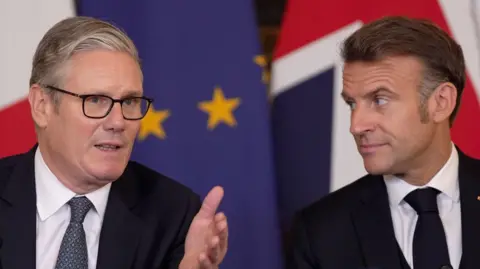The diplomatic landscape surrounding the recognition of Palestinian statehood has taken a significant turn following the announcement made by French President Emmanuel Macron. His intention to officially recognize Palestine puts pressure on British leaders, particularly Sir Keir Starmer, to consider a similar course of action. This development marks a high-stakes moment for both France and the UK, signaling a potential shift in international relations regarding the Palestinian territories.
For some time now, France has been eager to make this announcement. Delays in its original plans were attributed to escalating tensions following attacks by Israel and the United States on Iran’s nuclear facilities. Macron has indicated that formal recognition will take place at the UN General Assembly in September, creating an air of anticipation surrounding the implications of this diplomatic gesture. France’s strategy appears geared toward generating momentum that could encourage other nations to join them in recognizing Palestinian statehood.
Macron’s actions are emblematic of his broader approach to foreign policy, where he often seeks to make bold pronouncements on the global stage. However, this is not without risks. The French president is particularly counting on the UK to embrace this initiative, as highlighted during his recent visit to the British Parliament. He firmly stated that collaborative efforts to recognize Palestine represent “the only path to peace,” establishing a direct appeal to his UK counterparts.
French officials have expressed that if the UK were to act alongside France, it could inspire other countries to follow suit. The significance of this lies not only in the two nations’ roles in the UN Security Council but also in the potential for shifting the narrative around the recognition of Palestinian statehood. Notably, one senior diplomat articulated that recognition in tandem with the UK could reinvigorate the peace process, emphasizing a desire to include all parties in negotiations and commitments relating to both Palestinian autonomy and Israeli security.
Yet, the UK Prime Minister has shown hesitation towards this course, reflecting a long-standing British policy that has traditionally prioritized avoiding “gesture politics.” There are concerns that the French decision may not yield the expected outcomes, with skeptics questioning the efficacy of such a symbolic act outside of a more comprehensive plan. UK officials have featured a perspective advocating that diplomatic efforts should ultimately lead to long-term resolutions, using recognition as a means to drive negotiations rather than as an endpoint.
The divergence in policy perspectives highlights the complexity surrounding this issue. For the UK, historically, recognition of Palestinian statehood has been entwined with alliances with the United States and Israel, both of whom oppose immediate recognition, framing it as a potential endorsement of terrorism. Furthermore, the UK government remains cautious about extending support to what it views as an unreformed Palestinian Authority. Current diplomatic strategies suggest that the UK may be stalling for time, preferring to prioritize security and a ceasefire as prerequisites for any official recognition.
Recent statements from the UK have indicated a desire for conditions to be met, with Foreign Secretary David Lammy stressing that recognition should form part of a broader strategy aimed at establishing a two-state solution that upholds the rights of Palestinians and ensures security for Israelis. There’s a growing political urgency within the UK as various factions, including retired diplomats and current MPs, intensify calls for recognition.
The public discourse is rapidly evolving, underscored by notable comments from figures within the Cabinet, challenging the official position. The convergence of views advocating for recognition creates a potent environment, where failure to act could provoke significant political backlash, potentially akin to past domestic issues that sparked Labour backbench revolts.
As this diplomatic situation unfolds, eyes are keenly watching the UK government’s responses. Should it disregard Macron’s lead, it risks losing valuable parliamentary support. Conversely, following France may lead Britain into a situation of recognizing Palestine without yielding any substantial diplomatic advantage.
Indeed, over 140 countries have recognized Palestine as a sovereign state, and with recent nations joining this list—including Ireland, Spain, Norway, and Slovenia—the weight of political declarations on Palestinian statehood has grown. Yet, the true impact of these recognitions on the ground, particularly for the people of Gaza, remains uncertain, presenting a layered challenge for all involved in advocating for justice and peace in the region.











